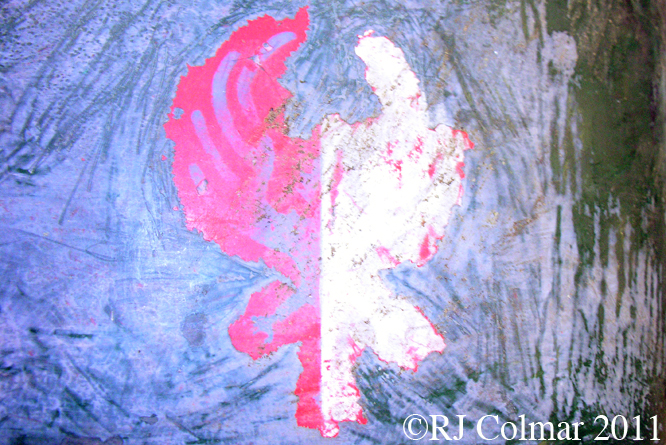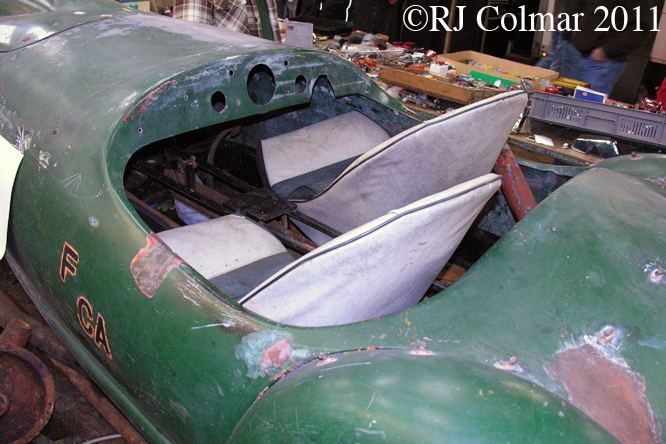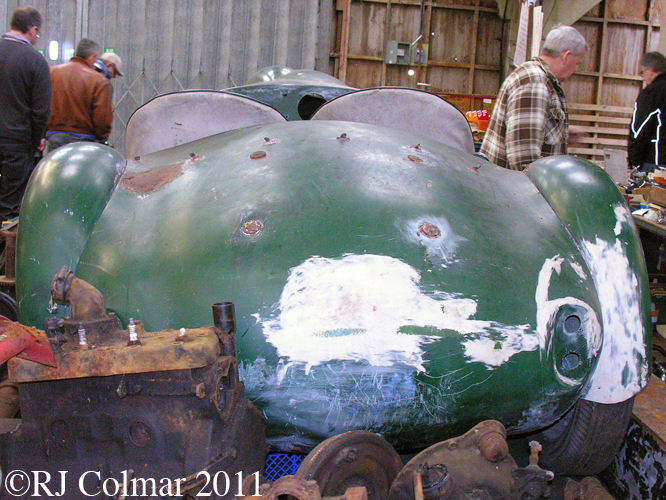After he had finished fabricating the Len Terry designed Eagle monocoques for All American Racers (AAR) in California, John Lambert returned to the Untied Kingdom and started a new business which was located on a small industrial estate outside Poole in Dorset where the rent was cheap. When Len Terry fell out with Frank Nichols they wound up Transatlantic Automotive Consultants based in Hastings where they had designed the AAR Eagle and Terry went to join Lambert, with whom he had worked at Lotus and AAR, in Poole starting a new business together called Design Auto.
In 1969 Len Terry started to design a series of stock block Formula 5000 open wheel cars called Leda’s, John Lambert looked after the construction of them in a facility off Balena Close on the Creekmore Industrial Estate on the outskirts of Poole, Dorset. When Leda Cars ran into financial difficulty they merged into the Malaya Garage Group in 1970. Three years later Malaya Garage Group did a deal with New Zealand racer Graham McRae selling the Leda Cars premises “lock, stock and barrel” with the cars manufactured now rebranded as McRae’s.
At around this time Roger “The Captain” Penske and Mark “Captain Nice” Donohue were experiencing many successes on the US racing scene which included three Trans Am championships, then only for manufacturers, driving the Captains Chevrolet Camaro in 1969 and AMC Javelins in 1970 and ’71.
In 1972 Mark won the Indy 500 in Roger Penske’s McLaren M16 and at the end of the year drove Penske’s McLaren M19 in the Canadian and US Grand Prix finishing a more than credible 3rd in his debut Grand Prix. The following year Mark and Roger won the Can Am championship with the “Turbo Panzer” Porsche 917/30. Having achieved pretty much everything in the US, including a NASCAR Winston Cup win at Riverside driving a Penske AMC Matador to become the last ‘road ringer’ to win a non oval race in that series back in 1973 Mark announced he would hang up his helmet at the end of the season.
Roger Penske made plans for a Formula One team in 1974 and sent Heinz Hofer to look at Graham McRae’s ‘low profile’ premises on the Creekmore Industrial Estate in Poole, Dorset UK as a possible base and concluded a deal for the premises. The Ford Cosworth DFV powered Penske PC1 was built to a design by Geoff Ferris and Mark Donohue was persuaded to come out of retirement to drive the car on it’s debut in the 1974 Canadian Grand Prix where he qualified 24th and finished 12th 2 laps down.
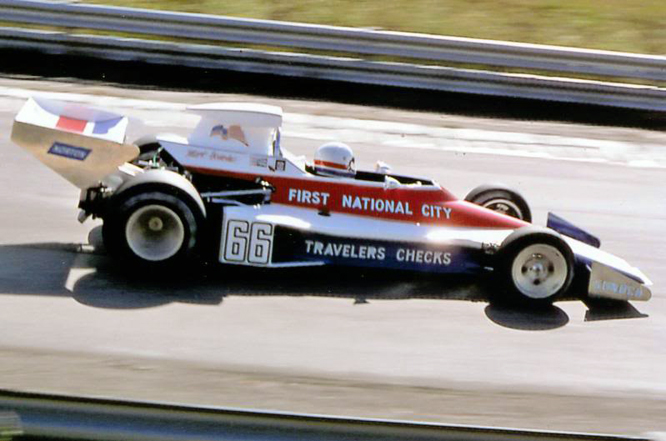
At the US Grand Prix, where Mark Donohue and Roger Penske fan, Brian Brown took today’s photograph of Mark in the PC1 at Watkins Glen the car started 14th on the grid, but retired after 27 laps with rear suspension problems. Brian recalls his first visit to a Grand Prix thus :-
“I was of course very excited to be seeing Mark race again, but being that it was my first live Formula One event, I was equally excited to be seeing Mario’s effort with Vel’s Parnelli Jones and the rest of the grid in person. We owned a Ferrari 365 GTB/4 Daytona and a 246 GT Dino at the time, so were very supportive of the Ferrari effort too.
My brother, friends and I spent a great deal of down time in the Kendall Garage watching the teams go about their business of working on the cars. One thing that was apparent was the absolutely professional presentation of the Penske team. Everything was spotless, just like their successful Indy Car counterpart that I’d observed in person since 1969 at Indianapolis. I was then, as now, a huge fan of Mark Donohue and Team Penske, but that aside, I always felt that they had too many positive resources not to be successful in Formula One.
I knew racing well enough to understand how tall the task Mark and the Penske team had ahead of them, but I also had the highest faith in their collective talents that I felt, given time, they would come right. I look back now and remember how I’d call in to our local ABC news tv affiliate to get the results of the races in 1975, always asking about the top six finishers along with Mark and Mario’s results.
Then came Austria and it was over for Mark and eventually Penske stopped the project – I was always appreciative that they carried on to get the victory with John Watson in Austria a year after Mark’s accident, something of a vindication for the mighty challenges that Team Penske faced in their Formula One foray. Watkins Glen 1974 was the last I ever saw Mark in person and despite the nearly 40 years that have passed, it seems like yesterday.”
Penske ended up building 3 chassis to the PC1 design chassis #001 seen here achieved a best 5th place finish, from 16th on the grid in the 1975 Swedish Grand Prix. Three races later Penske ditched the PC1 in favour of a March 751 which was raced until a new challenger until the new Penske PC3 was ready. As Brian alluded to above Mark Donohue was killed during practice for the 1975 Austrian Grand Prix after a tyre deflated pitching him off the track in to an accident which killed a marshal. Although Mark initially survived the incident he died the next day from a cerebral hemorrhage.
The debut of the Penske PC3 was delayed until the 1975 US Grand Prix where John Watson drove it in practice. Due to a misfire with the motor in the new car the team elected to wheel out today’s featured chassis one more time, John qualified 12th, finishing the race in 9th.
The following season Penske entered John in the PC3 and later PC4 models. With the latter the team won the 1976 Austrian Grand Prix, despite this success The Captain closed the Formula One program down at the end of 1976, deciding his future lay in the US racing seen where he would become the dominant force in Indy Car racing, with many of his winning cars being built in Poole, Dorset. Penske maintained facilities in Poole Dorset up until 2006. When the factory was closed one employee, Ivor, remained who had been part of the story going back to the Leda days, through the McRae years and into the Penske era.
In 2012 Brad Keslowski won his first NASCAR Championship driving a Penske entered Dodge a hitherto elusive goal on ‘The Captains’ to do list.
My thanks to Brian ‘ B² ‘ Brown for kindly agreeing to share his photograph; to kayemod, Nigel Beresford, Tim Murray, Tony Matthews, Dogearred and Doug Nye at The Nostalgia Forum for their help in piecing together the story behind Roger Penske’s presence in Poole, Dorset and a tenuous connection in the form of Lambert & Terry and their Leda Cars premises between the AAR Eagle and Penske Formula One efforts.
Thanks for joining me on this “Balena Close, Poole, Dorset” edition of “Gettin’ a li’l psycho on tyres”, I hope you will join me again tomorrow. Don’t forget to come back now !
PS Shortly before this blog was posted some confusion has come to light about which buildings in Poole Penske and McRae occupied and when, local resident kayemod and Nigel Beresford who worked for Penske have confirmed that Penske took over the Balena premises from McRae, while artist Tony Matthews is sure he visited a second facility a couple of miles away on Factory Road to do cutaway drawings for McRae and Penske is not so sure the Balena Close address is correct. If any further developments come forth I shall post them below, and if you know the answer to the riddle please do not hesitate to chime in.
PPS Nigel Beresford has kindly confirmed with another former Penske employee Nick Goozée that the Balena Close facility is the only one Penske purchased from Graham McRae. My thanks to Nigel and Nick for settling the matter so promptly.
PPPS
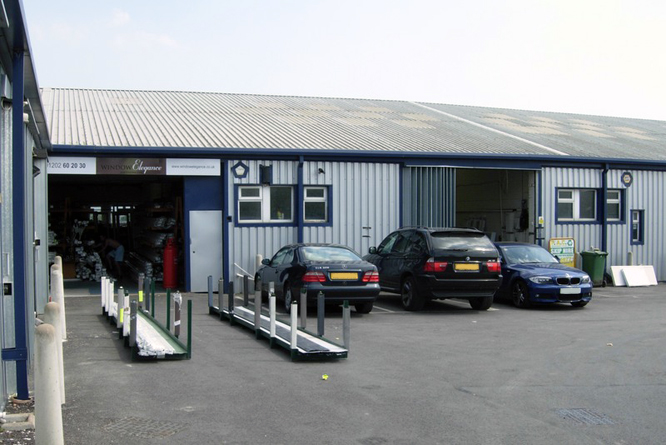
Kayemod Rob from the Nostalgia Forum has kindly sent me this photo showing “how that corner of Balena Close looks today, the small unit to the right is the original Penske UK base, formerly McRae Cars. The three parked cars more or less cover the width of the premises. The ‘Elegance’ unit to the left of Penske was once FKS Fibreglass, later Griffin Design. My ex-Specialised Mouldings chum stylist Jim Clark worked at FKS, and as well as Penske’s stuff, they also did almost everything for the Gulf GT40s and Mirages among others, their unit extended leftwards to fill the corner of the block. Penske later rented an identical unit to the right of the pic, which doubled their floor area, after some of the dividing wall was removed, they used to run their F1 operation out of that.”
Thanks Rob.


